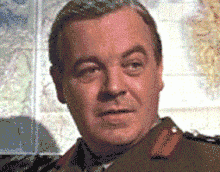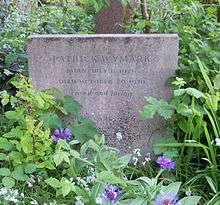Patrick Wymark
Patrick Wymark (11 July 1926 – 20 October 1970) was an English stage, film and television actor.[2]
Patrick Wymark | |
|---|---|
 in Where Eagles Dare (1968) | |
| Born | Patrick Carl Cheeseman 11 July 1926 Cleethorpes, Lincolnshire, England |
| Died | 20 October 1970 (aged 44) |
| Resting place | Highgate Cemetery, London |
| Monuments | Wymark View, Grimsby |
| Alma mater | University College, London Bristol Old Vic Theatre School |
| Occupation | Stage, film and television actor |
| Years active | 1959–70 |
| Organization | Royal Shakespeare Company |
| Home town | Grimsby, Lincolnshire, England |
| Television | The Plane Makers (1963–65) The Power Game (1965–69) |
| Spouse(s) | |
| Children | Jane Wymark (b. 1952) Rowan Wymark (b. 1954) Dominic Wymark (b. 1960) Tristram Wymark (b. 1962)[1] |
| Relatives | W. W. Jacobs (paternal grandfather-in-law) |
| Awards | British Academy Television Award for Best Actor (1965) |
| Website | wymark |
Early life
Wymark was born Patrick Carl Cheeseman in Cleethorpes, Lincolnshire, the son of Thomas William Cheeseman and Maria Agnes (née Olsen), daughter of Carl Olsen, a Finnish seaman.[3] He had an older brother, John William Cheeseman (born 1924). He was brought up in neighbouring Grimsby and frequently revisited the area at the height of his career. He was educated at St Mary's Catholic School and Wintringham Boys' Grammar School in Grimsby, before being conscripted into the Royal Navy during World War II and serving as a midshipman in the Mediterranean. On being discharged, he received a government grant to read English at University College, London, where performed in the university's dramatic society.[4]
Career
Wymark dropped out of university to train at the Bristol Old Vic Theatre School and making his first stage appearance in a walk-on part in Othello in 1951. He toured South Africa the following year and then directed plays for the drama department at Stanford University, California.
After moving to the Shakespeare Memorial Theatre in Stratford-upon-Avon, Wymark played a wide range of Shakespearean roles, including Dogberry in Much Ado About Nothing, Stephano in The Tempest, Marullus in Julius Caesar and Bottom in A Midsummer Night's Dream. Other stage credits included the title role in Danton's Death and, with the Royal Shakespeare Company (RSC), Ephihodov in The Cherry Orchard. His theatre roles also included Bosola in a RSC production of John Webster's The Duchess of Malfi in 1960.
In television, Wymark was best known for his role as the machiavellian businessman John Wilder in the twin drama series The Plane Makers and The Power Game (which were broadcast from 1963 to 1969), which led to offers of real company directorships and the British Academy Television Award for Best Actor in 1965. However, Wymark was a gentle person in real life and was, by his own admission, ignorant of business matters. He considered the character of Wilder a "bastard" and was described by his wife Olwen as "the most inefficient, dreamy muddler in the world."[5] In the mid-1960s, Wymark was considered as the replacement for William Hartnell in the title role of Doctor Who.
Wymark's film appearances included: Children of the Damned (1964), Operation Crossbow (1965), Repulsion (1965), Where Eagles Dare (1968), Witchfinder General (1968), Battle of Britain (1969), Doppelgänger (1969), The Blood on Satan's Claw (1970) and Cromwell (1970)
Personal life
Wymark married American playwright Olwen Buck (known as Olwen Wymark) in 1953; the couple met while both were students at University College, London. He took his acting name from his wife's paternal grandfather, the writer William Wymark Jacobs. The couple lived near Parliament Hill in Hampstead, London, and had four children, including the future actress Jane Wymark.

Wymark died suddenly in Melbourne, Australia on 20 October 1970, aged 44, of a heart attack in the hotel room in which he was staying. He had been due to star in the play Sleuth at the Comedy Theatre three days later. On the night of his death, he was to appear on the TV variety programme In Melbourne Tonight.[6] He, guest Richard Deacon and host Stuart Wagstaff had just appeared together in a TV production of Hans Christian Andersen stories,[7] and his non-appearance led to several jokes by Wagstaff and Deacon. Host Wagstaff was informed of Wymark's death mid-way through the programme and announced it at the end.
He was buried at Highgate Cemetery in London. Wymark View—located in his home town, Grimsby—is named after him.
Selected filmography
- The League of Gentlemen (1960) as Wylie
- The Criminal (1960) as Sol
- West 11 (1963) as Father Hogan
- Dr. Syn, Alias the Scarecrow (1963) as Joesph Ransley
- Children of the Damned (1964) as Commander
- The Secret of Blood Island (1964) as Major Jocomo
- Operation Crossbow (1965) as Prime Minister Winston Churchill
- Repulsion (1965) as Landlord
- The Skull (1965) as Marco
- The Psychopath (1966) as Inspector Holloway
- Woman Times Seven (1967) as Henri (segment "At The Opera")
- Tell Me Lies (1968) as Guest
- Witchfinder General (1968) as Cromwell
- Where Eagles Dare (1968) as Colonel Wyatt Turner
- Doppelgänger (1969) (alternative title: Journey to the Far Side of the Sun) as Jason Webb
- Battle of Britain (1969) as Air Vice Marshal Trafford Leigh-Mallory
- Cromwell (1970) as The Earl of Strafford
- The Blood on Satan's Claw (1970) as The Judge
- Chelovek s drugoy storony (1972) as Christian Holm (final film role)
References
- http://www.nndb.com/people/805/000278968/
- "Patrick Wymark". BFI. Archived from the original on 14 January 2009. Retrieved 12 January 2015.
- "Person Details for Carl Olsen in household of Edward Andersen, "England and Wales Census, 1881" — FamilySearch.org". Familysearch.org. Retrieved 12 January 2015.
- "Life". The Patrick Wymark Boardroom. Retrieved 24 June 2018.
- "The Sydney Morning Herald - Google News Archive Search". News.google.com. Retrieved 12 January 2015.
- "Hans Christian Anderson (1970) (TV)". IMDb.com. Retrieved 12 January 2015.